Works
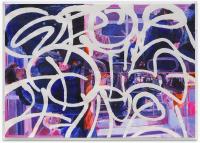
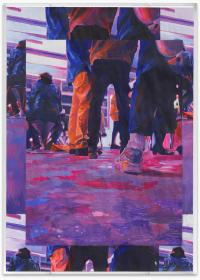





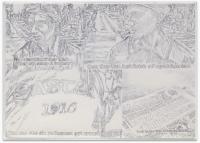
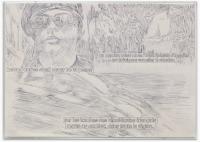

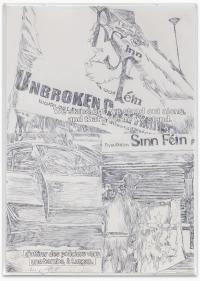




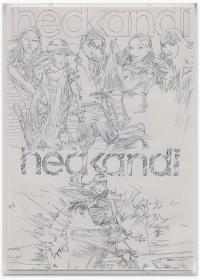
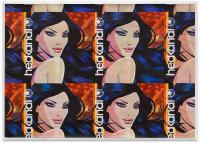


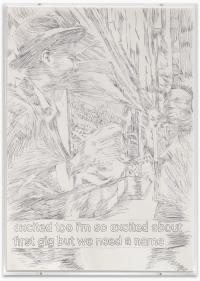

Installation Views
Press Release
Words by Jamie Stevens
I read somewhere a quote by the poet John Ashbery that was something like “I notice that when you try to communicate with people eventually they lose interest but if you talk to yourself people want to listen in”. I find the work of Alan Michael to be quite direct in its methods but unnerving in terms of what we are supposed to do with it, in a way that links in my mind to this misremembered Ashbery quote. Michael’s paintings and drawings seem to operate without orthodox communicative structures even though all the important parts –image, labour, style, theme, attitude– are very much present. When the artist asked me to write this text, I suggested that we have a conversation where he mostly listens and I mostly talk. I wanted my thoughts about the work to emerge in a spontaneous way under the pressure of our pre-existing friendship and I liked the idea of inverting the artist-interview format. I asked Alan to write down what he could recall from the conversation once it had ended and it is published here unedited. This parallels a major task in my own life, where fifty-minute sessions from my psychotherapy practice must be written from memory in order to be shared with colleagues and supervisors. I find it endlessly maddening how much must be missing in my written accounts but the process of committing my own roughly rendered memories into words always brings new vantage points for understanding that seemed unavailable in the original encounter. There is a strong echo here to the pleasures I take in Alan Michael’s works.
My own recollection of the conversation below and its contents is, inevitably, very different.
Jamie Stevens
//
JS mentioned that normally he’s in the role of analyst so was waiting for me to call, so the call was a few min late. We agreed this confused start seemed significant but couldn’t work out what exactly, probably uncertainty on both sides. Something got said about internal monologues and I asked about if JS has internal monologues and how that goes. He talked about his father speaking to himself out loud when he was a kid. JS spoke about how he created an idea that whenever he was thinking internally that it was a conversation with God. He quickly told an anecdote about discarding belief in God as a teenager. JS said something like this is a possible way to speak about my work and so to write about my work, maybe this could be a way. Like a way in, who does the work speak to, or where does it speak from. He said he enjoys talking about my work. JS said something about hesitancy and distance in the work and said something about the word Waiting and I was interested a lot in the word Waiting. I asked him to talk about waiting in relation to my work.
I was continually worried about my bad memory for recall of reported speech, what someone just said. Several times JS was really positive and complimentary about my work in general. I don’t remember these so well.
The thing about the work is on paper came up a lot. Like the decision to make the work on paper and not oil on canvas, and how we had spoken about that before. JS spoke about the title of the show, ‘Friendly Street’ and that it brings to mind thinking about friendship, how we are friends, and the meaning and implications of friendship. I think I was cutting in here and keen to say I tried to mean that the title isn’t a double meaning but I think it was unnecessary to say that. I think near the end I said something again about the title Friendly Street and how maybe it is double meaning or something because being in London is like you’re in a place with a double meaning.
I was concerned about irony and sarcasm and asked or hoped that the title wouldn’t seem like a joke. While JS was talking about the title I was flashing on picturing the street, the real Friendly Street, and how I walk down there sometimes after hanging out at JS’s flat. I’m seeing it at night.
I talked about credibility and authority, trying to engender that into works, and maybe something about the status of works on paper being hard for that to work? I talked about my anxiety on the kind of reception my work typically makes. JS mentioned odd mixes in the work and said the word ‘porousness’. JS said something like my general style being distant and having authority through its ambivalent vibe, when I asked about how he receives it.
JS linked the pictures in my show to my previous works and spoke about the stuff depicted, magic show channels, IRA militants, the studio party, maybe the word Hedkandi as well, as being identifiable as part of a continuum with past shows. He specifically named those components as being things he could identify as part of my output, as typical in a positive way.
Hedkandi we talked about that, how it's just a brand, or just another brand, another product. I agreed with him that its consistent with previous series of my works. JS mentioned a speech by a French politician speaking at a demonstration about the protests not being singularly about retirement age and hoping it could be a wider statement against diminution of general rights of living, of the right to do nothing productive. JS said something about militancy, thinking too about the IRA in my drawings. He mentioned the word control or the idea of control in my work, or my control of it.
JS spoke about the fact that the works are on paper being a break from something or representing a meaningful change in the type of work I make. I asked about the meaning inherent in having works on paper. JS mentioned the frames, that the images are glazed. I said that I thought that the format of works on paper is something that an artist would or should engage with or that their work would generate this as a by-product, or even like a diary. I didn’t actually say that, but that’s what I meant. JS I don’t think totally agreed, but I tried to say that I was, in my way, trying to fulfill a function.
I asked something like how does my work make you, a person in general, feel or what the impression is. I think JS said it seems like there’s a withheld part of it that is detectable and tantalizing and he used the word generous but I can’t remember this part properly. I might be wrong about that.
I was feeling I was saying far too much because I find it really difficult to leave silences alone, despite specifically being told that’s fine in this context. By now, I maybe realize I don’t listen to people when they speak. I found myself speaking without knowing what I’m going to say.
JS spoke about the photos of a party that make up a portion of the works, that the photos are of a party at the studio and how my work is typically not produced in that kind of atmosphere, how they communicate a disciplined approach to production. I think he was pointing out a contrast in the event depicted and the general demeanour or the artwork and practice I’ve got.
I asked if JS thought my work is communicative and he confirmed it does communicate. I got the impression in a non- specific way. I said I’m anxious about confusing people or coming across as confusing as though that’s on purpose or being used as a device in itself. JS said that the confusion aspect is a characteristic and that's useful.












